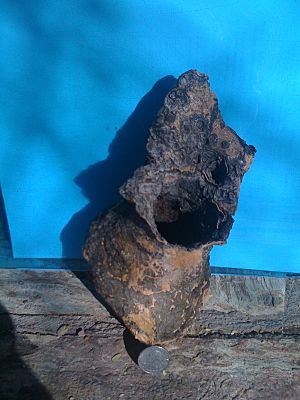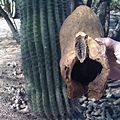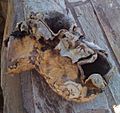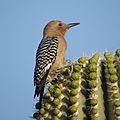Saguaro boot facts for kids
A saguaro boot is a special, hard shell that forms inside a saguaro cactus. It's like a natural cast or mold. This happens when a bird, like a woodpecker, pecks a hole in the cactus to build a nest. The cactus then creates a tough, woody lining around the hole to protect itself. When the saguaro cactus eventually dies and its soft parts rot away, these hard, hollow shapes are left behind. They often look a bit like a boot, which is how they got their name!
Contents
What Are Saguaro Boots?
A saguaro boot is made from a special, hard tissue that the cactus grows. This tissue is called a callus. It becomes very strong because it's filled with a tough material called lignin. Lignin is what makes wood hard. The saguaro cactus creates this hard shell to protect the wound made by a bird's nest.
How Birds Make Homes in Cacti
Several different kinds of birds make nest holes in saguaro cacti. The Gila woodpecker (Melanerpes uropygialis) makes smaller holes. These holes are usually about 5 centimeters (2 inches) wide. They are often found in the middle part of the cactus. The Gila woodpecker also eats small bugs found under the cactus skin.
The larger gilded flicker (Colaptes chrysoides) drills bigger holes. These birds usually make their nests higher up on the cactus. Their beaks are strong enough to break through the tough ribs of the saguaro.
The Cactus's Amazing Response
When a bird makes a hole, the saguaro cactus protects itself. It secretes a sticky, tree-sap-like liquid. Over time, this sap hardens into a bark-like shell. This hard shell does two important things. First, it stops the cactus from losing its valuable water. Second, it makes the nest hole waterproof, keeping the bird's home dry.
A bird's nest hole isn't ready right away. It takes about a year for the cactus to fully line the hole. Many saguaros can have several nests inside them. If birds dig holes close to each other, a single saguaro boot might form with more than one opening.
Saguaro Boots in History
Long ago, Native American groups like the Seri used saguaro boots. They found them useful for carrying or storing water. Today, it is against the law to collect saguaro boots from nature in Arizona.
Other Cactus Tunnels
Birds are not the only creatures that make tunnels in saguaro cacti. Some desert moth caterpillars also dig tunnels inside them. The hard callus that forms around these caterpillar tunnels looks different. It's usually a flattened, disk-like shape where the caterpillar exits. This is different from the larger, boot-shaped hole made by birds.
Gallery
-
Close-up of living saguaro with hole, wound-response lignin, quarter shown for scale
 | Toni Morrison |
 | Barack Obama |
 | Martin Luther King Jr. |
 | Ralph Bunche |














